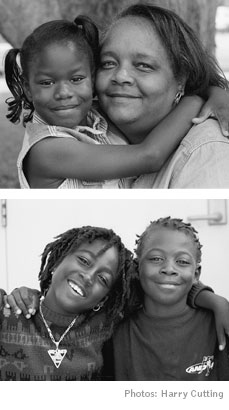


by Judy Purdy
Intro
| Page Two


Brody and Murry have translated their findings into a program — Strong African-American Families Programs, or SAAF (pronounced “safe”) — to help other parents learn and adopt sound parenting practices. Based on studies of more than 1,000 families, SAAF now has been tested with an additional 750 rural African-American families.
Parents and their 11-year-olds were randomly assigned either to receive pamphlets on topics such as stress management or to participate in seven, two-hour interactive SAAF sessions, where parents learn and practice parenting skills while children learn such things as future orientation and qualities to look for in a friend.
SAAF families developed better communication and goal-setting skills while the other families declined in those areas. And as families’ at-risk levels increased, so did the benefits of SAAF participation.
A central aspect of their research is that it recognizes the importance of extended kinship, community involvement and the strong sense of neighborhood among rural, African-American families. “They help raise each other’s children,” Brody said. “The social support network is not as evident in city areas.”
The two professors, who have collaborated since 1995, call their preventive-intervention research a chance to help people develop success-promoting behaviors. Once they finish evaluating how well the SAAF curriculum translates to other regions, they will make it available to community organizations nationwide.
Meanwhile, they are expanding SAAF to include African-American adolescents aged 15 and 16 and young adults aged 18 to 23, a group the researchers call “emerging” adults. The researchers hope to identify what enables both groups to transition successfully to adulthood against a backdrop of high dropout rates, crime and other stressors.
Aided by a $3.5 million National Institutes of Mental Health (NIMH) Developing Center Grant that fosters new ways of doing research, they have formed interdisciplinary research groups to develop new ways to analyze data, determine the optimum number or “dosage” of weekly sessions, identify community characteristics that foster or impede prevention-service delivery, and investigate ways to engage rural African-American families in such programs. Their collaboration with North Carolina Agricultural and Technical State University, a historically black institution, evaluates the SAAF program in other African-American communities.
Between them, Brody and Murry direct nine research grants worth a total of $23 million from various agencies, such as the National Institutes of Health and the Centers for Disease Control and Prevention. They collaborate with faculty at UGA and other universities on programs to help prevent under-age drinking, early sexual activity and teen pregnancy, HIV infection, teen suicide and child abuse. They also study health-promoting behaviors among older African Americans with type 2 diabetes.
“Before our work,” Murry said, “there were no family-centered, research-based prevention programs for African-American families that were scientifically tested in a prevention trial.”
Now that they have created such a program, Brody and Murry are planning for the day they can study the next generation of African-American parents who once were 11-year-olds in the SAAF study.
For more info, access www.cfr.uga.edu or email Gene Brody at gbrody@uga.edu or Velma McBride Murry at vmurry@uga.edu.
Judy Purdy is director of the UGA Research Communications Office and editor of UGA Research Magazine.
Intro
| Page Two
For comments or for information please e-mail the editor: jbp@ovpr.uga.edu
To contact the webmaster please email: ovprweb@uga.edu
![]()